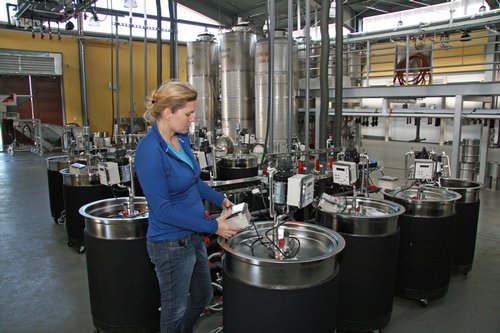
A new winery, brewery and food-processing complex began operations this fall at UC Davis. Part of the Robert Mondavi Institute for Wine and Food Science, the technologically sophisticated facilities will be used to teach students, conduct research, and solve practical problems related to foods, beverages and health.
The south wing of the new complex is home to the August A. Busch III Brewing and Food Science Laboratory, which includes the brewery, general foods-processing plant and milk-processing laboratory. The complex’s north wing houses a new teaching-and-research winery. The complex is adjacent to a 12-acre teaching-and-research vineyard and across a courtyard from the departments of Food Science and Technology, and Viticulture and Enology.
The new $20 million, 34,000-square-foot complex, funded entirely by private donations, will be the first winery, brewery and/or food-processing facility to earn LEED Platinum certification, the highest environmental rating awarded by the U.S. Green Building Council. (LEED stands for Leadership in Energy and Environmental Design.)
Features include onsite solar power generation and a system for capturing rainwater and conserving processing water. Stored rainwater will be used for landscaping and toilets.

Other features include maximum use of natural light, food-processing equipment that minimizes energy and water requirements, use of recycled glass in flooring, interior paneling recycled from a 1928 wooden aqueduct, and use of sustainably certified lumber.
The new brewery will showcase the latest in brewing technology, as well as a sophisticated laboratory for conducting research and training students. It also provides commercial brewers and suppliers with a small-scale facility to test new recipes or processes.
The general foods- and milk-processing laboratories have been built to meet state and federal food- and dairy-grade standards. Products processed there will be used in sensory and nutritional evaluations.
Research in the food-processing pilot plant will examine alternative food-processing methods and their nutritional effects, nutritional quality and shelf life of fresh-cut fruits and vegetables, nutritional enhancements from food-processing “waste” products, and improved food formulations.
The milk-processing laboratory will support research on separation of milk components into functional ingredients, processing of milk modified by different feed rations, and processing of milk from cows bred for specific characteristics.
Dozens of private donors helped make the complex a reality, including a $5 million contribution from the late winemaker, Robert Mondavi, and a $5 million pledge by the Anheuser-Busch Foundation.
Other major donations were made by Ronald and Diane Miller and by a group of winery partners led by Jess Jackson and Barbara Banke of Kendall-Jackson Wines, and Jerry Lohr of J. Lohr Vineyards & Wines. The Department of Viticulture and Enology’s Board of Visitors and Fellows also made significant contributions.
California tomato processors and growers contributed more than $2.5 million to the food-processing pilot plant. Morning Star Packing Company provided a lead gift of $1 million for the food-processing plant. Hilmar Cheese Company also stepped up with a $250,000 pledge.
In all, more than 150 individuals, alumni, corporations and foundations contributed funds for the new winery, brewery and food-processing complex.
(Thanks to Patricia Bailey, UC Davis News Service, who provided content for this post.)
Learn more at http://greenrmi.ucdavis.edu.